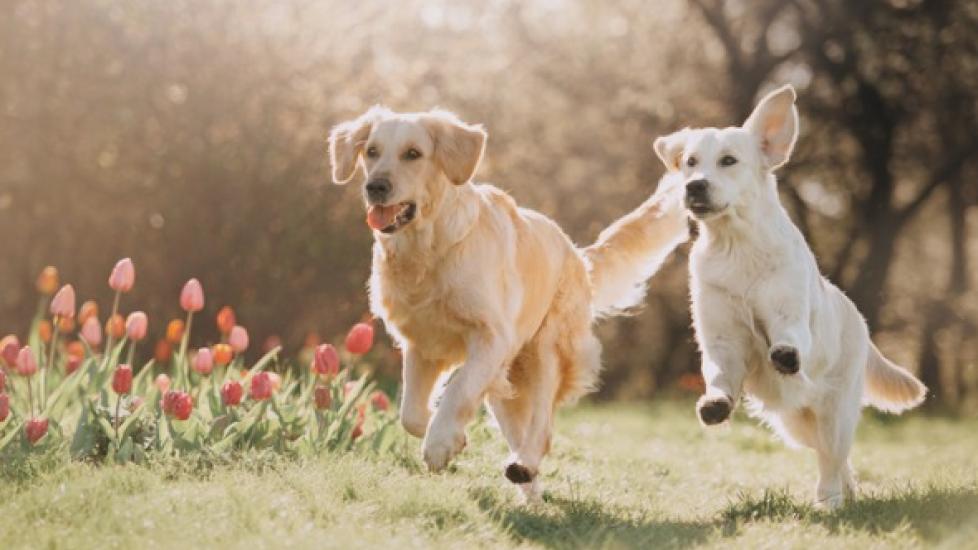Coccidia in Dogs
Is your dog or puppy having diarrhea, but it smells almost like fungus, or not like normal diarrhea? Funny-smelling diarrhea can be a sign of a gastrointestinal issue in your dog known as coccidia.
This guide will tell you everything you need to know about coccidia in dogs—from symptoms and causes to treatment and prevention.
What Is Coccidia?
Coccidia, also known as canine Cystoisospora spp. (formerly Isospera), is a protozoan parasite that can infect the gastrointestinal tract of dogs.
These tiny-celled parasites live in the wall of the intestine. Coccidia is most common in puppies but can also infect adult dogs as well as cats.
Vet Recommended Health Support
What Are the Symptoms of Coccidia in Dogs and Puppies?
Here are the most common signs of coccidia in dogs and puppies, and what you might see if a dog is severely infected.
Coccidia symptoms include:
-
Diarrhea that’s watery or bloody or has mucus
-
Weight loss
-
Dehydration
Severe signs of coccidia in puppies and dogs include:
-
Depression
-
Death
However, some dogs with coccidia can be asymptomatic and not show any signs of being infected. These infected dogs can still shed the egg-like structure in their feces and infect other dogs or puppies, so it’s important that your dog has a fecal exam at their annual and biannual vet visits.
How Do Dogs and Puppies Get Coccidia?
Dogs can get coccidia by ingesting the oocyst (immature coccidia) from a contaminated environment, such as soil or feces that contains coccidia.
Young puppies are more likely to become infected with coccidia when they are exposed to contaminated dog feces due to their underdeveloped immune system. This is why it is so important for puppies to have multiple fecal exams throughout their puppy visits with their veterinarian.
Stressful situations (traveling or moving to a new home environment), immunosuppression, or additional chronic diseases can make dogs more susceptible to coccidia infection.
Can Dogs Get Coccidia From Sheep, Rabbits, or Cats?
Coccidia is typically host-specific, meaning that dogs cannot be infected from the feces of another species (e.g., sheep, rabbits, or cats).
However, dogs may become infected through predatory behaviors when another species is ingested.
Can Coccidia Be Transmitted From Dogs to Cats?
Dogs cannot pass coccidia to cats, even if a cat is exposed to the feces of a dog with coccidia. Coccidia in cats is caused by a different host-specific coccidia parasite.
Can Humans Get Coccidia?
Coccidia is not a zoonotic disease, which means that humans cannot contract coccidia from a dog.
Coccidia Treatment in Dogs and Puppies
The treatment for coccidia in dogs is pretty straightforward—eliminate the parasite.
Get a Prescription From Your Vet to Treat Coccidia
The only Food and Drug Administration-approved treatment for coccidia is sulfadimethoxine, which must be prescribed by a veterinarian.
There are other drugs that are used with some success in the treatment of coccidia, such as ponazuril, which has shown to be effective from the most current published research.
Metronidazole can help treat the diarrhea that is caused by coccidia, but it does not rid the body of the protozoan parasite.
If your dog or puppy is infected with coccidia, administer the medications prescribed by your veterinarian and do not take your dog to areas like dog parks, boarding centers, and areas with high populations of dogs.
Clean Up After Your Dog
Coccidia can remain infective in the environment for several months.
You must thoroughly clean up your dog’s feces, and also clean the ground. This will help prevent other dogs from being exposed AND prevent your dog from being reinfected.
Clean up as much of the feces as you can with a bag and paper towels. You can then use an antibacterial spray or bleach to kill any remaining bacteria.
How to Prevent Coccidia in Dogs and Puppies
Fecal exams by a veterinarian are the best way to check for coccidia. These should be done at your dog’s yearly visit or if they are showing clinical signs, especially diarrhea.
Try to avoid environments with dogs or puppies that are currently infected with coccidia. If your dog is a puppy, avoid high-risk areas like dog parks.
Organize puppy playdates with healthy dogs in controlled, safe environments.
Featured Image: iStock.com/Ksenia Raykova
